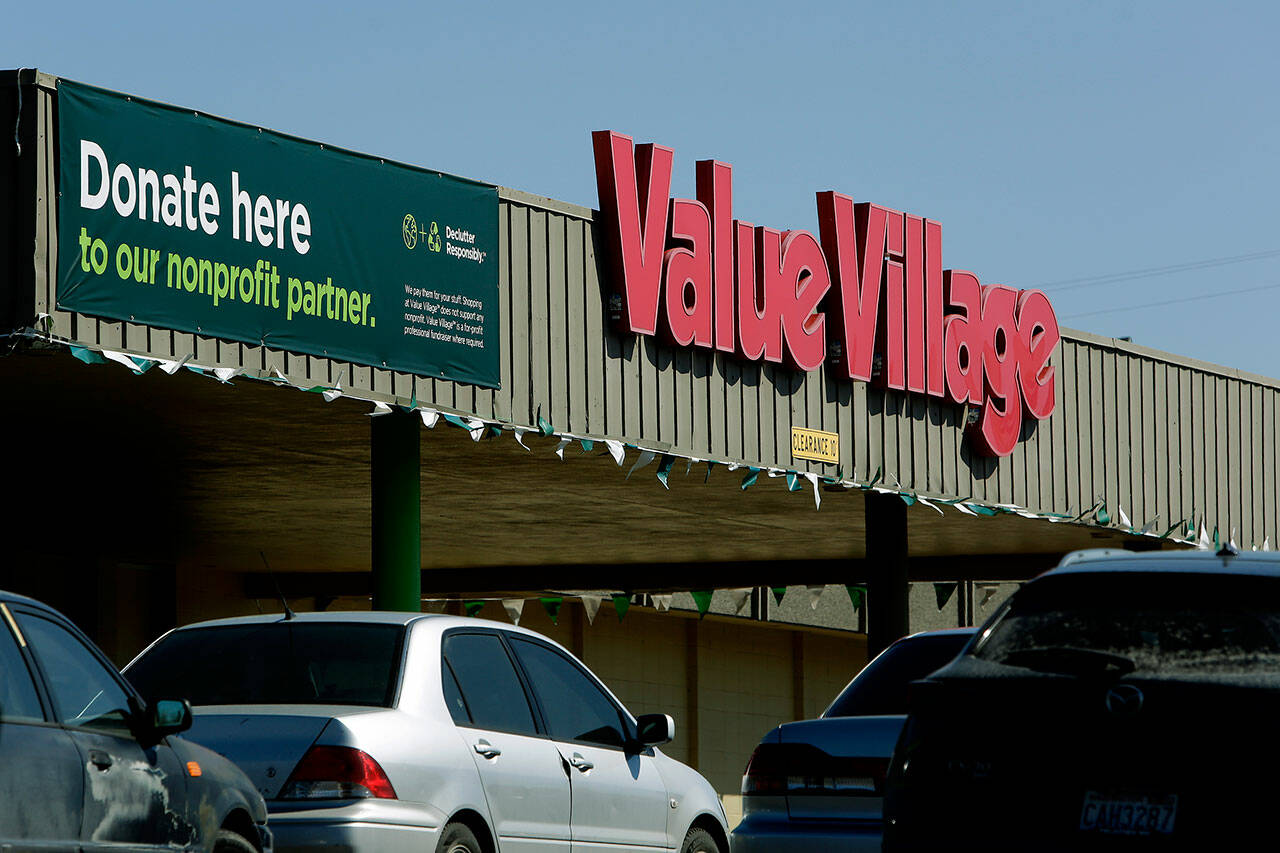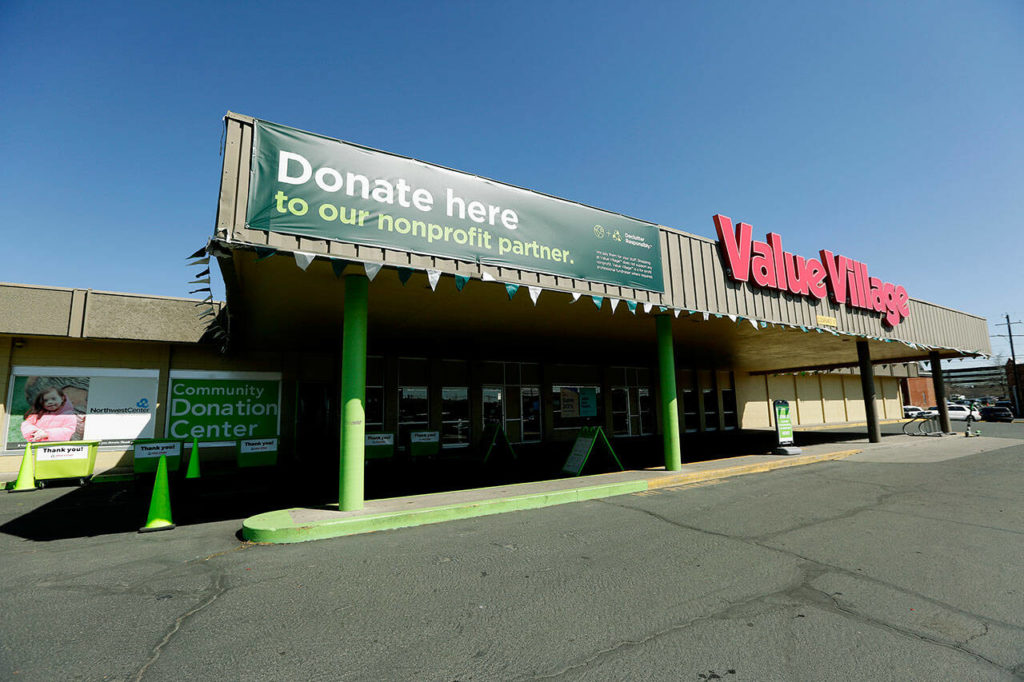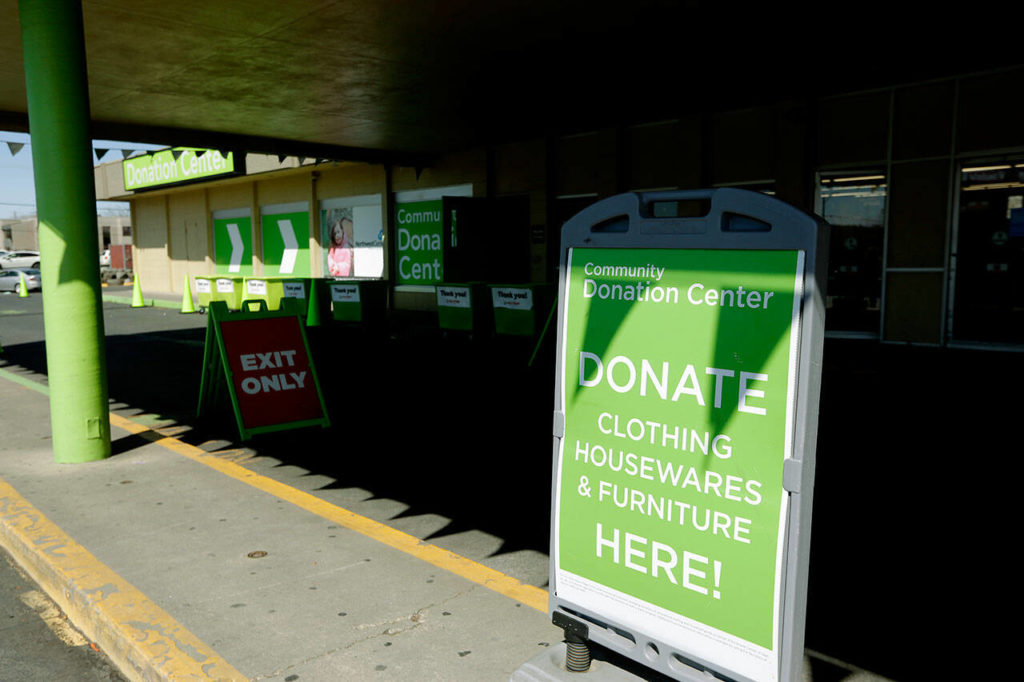By Francesca Lyman / InvestigateWest
LYNNWOOD — High above Highway 99, a massive, brightly lit sign advertises the “Value Village Donation Center.” On this rainy, gray Friday evening in early spring, eager shoppers fill the aisles of the Value Village store, flipping through racks of clothes, browsing displays of home décor and feeling their way through entire shelves of soft, plush bunny toys.
In front, two uniformed attendants help drivers unload bags at the marquee for the thrift store’s “Community Donation Center.” A smaller sign promotes “Northwest Center: ‘People of All Abilities,’” alongside a large photo of a little disabled girl in a pink, puffy winter jacket.
“You’ve got to help people who need it,” says Lynnwood shopper Kim Ti, who gives the store high marks for charity. “Everything in here is donated,” she says. She also finds the store clean, well-organized and filled with better-quality items than those in some other thrift stores that also take her donations. “I’ve given a lot here over the years.”
So the loyal donor and shopper was shocked to hear that Value Village is embroiled in a long-running court battle with the state of Washington, accused of violating several consumer protection laws.
It’s been more than four years since Washington Attorney General Bob Ferguson first sued TVI Inc., the Bellevue-based corporation that owns the Value Village chain, alleging that the company used deceptive marketing to make it look like a charity and “downplay its for-profit status.” Among other claims, the state charged that the company “unfairly and deceptively” created the impression “that TVI is a charity or non-profit organization and that purchases at TVI’s retail stores benefit charities — when they do not.”
The case has made its way from King County Superior Court to the state Court of Appeals and finally to the state Supreme Court, which agreed on March 30 to review the case.
Value Village maintains it has done nothing wrong. Its lawyer recently argued in court documents that Value Village “pioneered a model of partnering with charitable organizations to purchase used goods donated by the public to the charities,” thus providing “significant funding to its charity partners.”
The state, however, alleges that the company’s payments to the charities from whom it purchases are “drastically lower than the impression created by Value Village’s ads.” In his petition to the Supreme Court, Ferguson also states that calling the charity wholesale suppliers “partners” feeds “misperceptions” by customers and donors at Value Village stores about their true relationship.
The attorney general declared in recent filings that the state had proved at trial that “for over a decade” the company “deceptively advertised that it is a non-profit, charitable entity,” and “that TVI knew or should have known its advertising was deceptive,” in violation of the state Consumer Protection Act, which guards against “unfair or deceptive acts or practices” in trade and commerce.
If Value Village prevails, Ferguson argues, it could create a dangerous precedent, injuring the state’s ability to police deceptive marketing and encouraging “fraudsters” to scam the public in the future.
The state Supreme Court is expected to rule on the case in the next few months.
Charity watchers and thrift industry insiders say they are closely watching the case. “A lot of consumers have no idea that part of what they’re donating really is going to a private entity,” said Adele Meyer, executive director of NARTS: the Association of Resale Professionals, a trade group based in Michigan. “The money is going into the pockets of people owning these stores. Only a small percentage is going to the charities.”
‘A veneer of charitable goodwill’
In contrast to nonprofits that operate their own thrift stores, such as the Salvation Army or Goodwill, Value Village is a private equity company and, unlike those nonprofits, does not disclose revenue or the share of profits benefiting charity. The company does business as the conglomerate Savers Value Village, with more than 300 stores. Operating in the United States, Canada and Australia, Savers is the largest for-profit thrift store chain in the world, with over $1 billion in annual revenue.
InvestigateWest first reported in 2015 that the company’s “claims about doing good for charities appear to be vastly overblown.” The investigation revealed that some of Savers’ “charity partners” had received less than 5% of revenue on goods donated on their behalf and calculated that in general “between 8% and 17% of the firm’s revenue ends up with charities.”
Two years later, Ferguson sued the company in King County Superior Court. The judge sided with the attorney general’s primary claims, ruling in 2019 that TVI deceived consumers by giving the impression — “through ‘do-good, feel-good’ descriptions of its own business operations” — that the store was a charity. The judge cited an “overwhelming” barrage of misleading advertising, signs, brochures and in-store announcements.
That was round one. Since then, the AG’s office has been trying to beat back a state Court of Appeals’ ruling in TVI’s favor, issued last August. The court agreed with the company’s claims that its marketing to donors and customers is protected under the free speech provisions of the First Amendment. It ruled that the state Consumer Protection Act is too broad to cover the “strict scrutiny” for fraud actions required under the Constitution.
In court filings since that decision, Ferguson has continued to argue that TVI has wrapped itself “in a charitable veneer in advertising its goods.”
Buoyed by the state Court of Appeals decision, Sara Gaugl, TVI’s marketing director, told InvestigateWest, “Value Village has now prevailed on every claim asserted against the company. As always, we continue to focus on our mission to champion reuse, as we have proudly done in Washington for more than 50 years.”
The company does solicit donations of used goods for local charities as a for-profit fundraiser, having registered to do that for the first time in its history in 2015 after the state’s investigation of business practices. Founded in 1954, TVI has 14 stores in the state, soliciting principally for two charities, Northwest Center and Big Brothers, Big Sisters of Puget Sound. (In Snohomish County, besides Lynnwood, there are Value Village stores in Everett and Marysville.)
Still, the attorney general argues that, just because the company registered as a commercial solicitor, it doesn’t mean that all of the advertising and marketing it uses to promote its business should be entitled to “heightened First Amendment protection.”
The appeals court concluded that the trial court “rewrote” the statute to include a “mens rea” (or “intent”) clause to satisfy proof of fraud under the U.S. Constitution. In response, the attorney general argues that the trial court “properly interpreted” the statute as being aligned with the Constitution, even if the state law doesn’t have “intent” language. State lawyers say the judge looked at the consumer protection statute, which specifically prohibits “unfair or deceptive acts,” interpreting the term “deceptive” to also include misrepresentations “likely to mislead a reasonable consumer.”
Value Village denies the state’s charge that it misrepresents itself as a charity. “Just the opposite,” says TVI attorney James Grant, who also declares that the company has never said that charities are paid part of the proceeds of its sales.
Ferguson’s suit against TVI initially targeted Value Village for what it considered a practice of not paying charity suppliers for a subset of donations, such as furniture, before 2016. That, Ferguson said, was deceptive, since for years the company had advertised that “every time you donate, we pay our charity partners.” During the years of the state’s investigations, Value Village adjusted contracts to pay separately for everything “for clarity” rather than pooling together cloth goods and hard goods such as furniture (although the trial court did not construe the earlier way contracts were written to be deceptive). In Washington state, currently it pays just 3 cents for each piece of “furniture and other large items,” such as armoires, tables and bicycles, brought in by Big Brothers, Big Sisters of Puget Sound.
Washington’s suit came after Minnesota sued Savers in 2014, after complaints by consumers of potential deception. Savers settled with the Minnesota attorney general the next year. Without admitting guilt, Savers agreed to pay $1.8 million to six of that state’s charities and to overhaul its donation and disclosure practices.
“Contrary to its deceptive ‘do-good, feel-good’ advertising and ‘constant conflating of itself’ with actual charities, the nature of Value Village’s relationship with charities is simply this: The charities are suppliers from whom it purchases used goods to sell in its stores,” write Ferguson and Washington state consumer protection attorney John Nelson.
TVI vehemently objects to this characterization. In documents responding to Ferguson’s petition to the Washington Supreme Court, the company states that, through purchase of donated goods, “TVI provides significant funding to its charity partners: $13 million to Washington charities in 2016 and $125 million over 10 years.” According to state filings, the amount TVI paid to charities in 2020, the last year available, was $3.5 million.
Meanwhile, Savers says it adds “up to 10,000 new treasures … to each store’s racks and shelves” every day, while diverting “700 million pounds of clothing and textiles from landfills” each year.
While shoppers and donors might admire the chain’s laudable recycling accomplishments, its biggest pull is its connection to charity, according to the company’s own market research, including findings that shoppers’ desires to “help the community” outweigh environmental benefits, sustainable fashion or even ability to get a tax deduction.
When it comes to charity, though, shoppers and donors need much greater transparency so they can choose wisely about where to donate, consumer watchdogs say. Thrift stores, says Laurie Styron of CharityWatch, based in Chicago, “should be required to open their books for the public to verify any claims they are making about purchases supporting a charitable cause.”
Laws need to change, too, she adds, “to close the loopholes that allow for so much gray area in the marketing language” of thrift stores and other for-profit companies using a charitable cause to sell products. “The language needs to be clear enough that you don’t need to be a contract lawyer or CPA to understand it.”
TVI did not respond to InvestigateWest’s request to describe ways in which its business practices have changed since the lawsuits filed in Minnesota and Washington.
But one significant change in Value Village’s marketing that’s hard to miss is that now, as part of the charitable appeals, the company also includes disclaimers declaring that shopping in its stores doesn’t contribute to charity. On its website, on the “Donate” tab, for example, under “Donate your goods for the greater good,” the company says, in smaller type, “Shopping in our stores does not support any nonprofit.”
Ironically, some donors said they found the disclaimers themselves confusing. Ashley McEneny, a shopper in the Lynnwood store, says she was struck by announcements amid music declaring that “nonprofits are not benefiting from your purchases.”
“That implied to me that some legal ramifications of their operations were involved,” says McEneny, which “made me think there was something deceptive happening.”
InvestigateWest (invw.org) is an independent news nonprofit dedicated to investigative journalism in the Pacific Northwest. Visit invw.org/newsletters to sign up for weekly updates.
Talk to us
> Give us your news tips.
> Send us a letter to the editor.
> More Herald contact information.



























